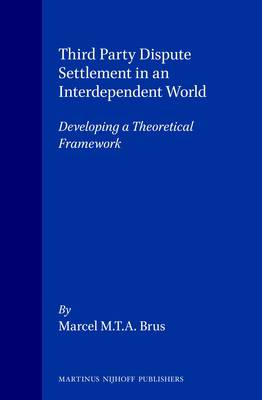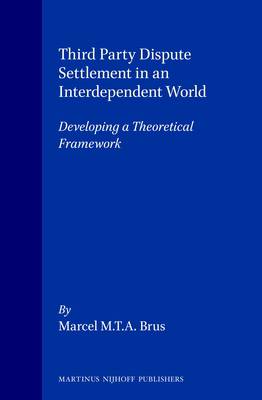
Door een staking bij bpost kan je online bestelling op dit moment iets langer onderweg zijn dan voorzien. Dringend iets nodig? Onze winkels ontvangen jou met open armen!
- Afhalen na 1 uur in een winkel met voorraad
- Gratis thuislevering in België vanaf € 30
- Ruim aanbod met 7 miljoen producten
Door een staking bij bpost kan je online bestelling op dit moment iets langer onderweg zijn dan voorzien. Dringend iets nodig? Onze winkels ontvangen jou met open armen!
- Afhalen na 1 uur in een winkel met voorraad
- Gratis thuislevering in België vanaf € 30
- Ruim aanbod met 7 miljoen producten
Zoeken
Third Party Dispute Settlement in an Interdependent World: Developing a Theoretical Framework
Developing a Theoretical Framework
Marcel Brus
€ 106,95
+ 213 punten
Omschrijving
The central theme of this book is the strengthening of the legitimacy and integrity of international law in the post-Cold War, interdependent international community. The investigation focuses on the relationship between international decision-making procedures, in particular compulsory third party dispute settlement, and legitimacy and integrity as perceived by states and other international actors. It starts with a description of recent developments with regard to dispute settlement in the law of the sea, GATT/WTO, Antarctica, and global environmental protection. Compulsory third-party dispute settlement has been accepted in treaty regimes in these fields as it is indispensable in safeguarding the legitimacy and integrity of such regimes. The focus then shifts to an extensive analysis of changes in the international community in general, and their consequences for the international legal system. By focusing on legitimacy and integrity, and by providing a theoretical framework in which these concepts can be applied, this book contributes significantly to the discussion of the theoretical foundations of international law.
The author is winner of the 1995 Award of the Foundation Praemium Erasmianum, Amsterdam.
The author is winner of the 1995 Award of the Foundation Praemium Erasmianum, Amsterdam.
Specificaties
Betrokkenen
- Auteur(s):
- Uitgeverij:
Inhoud
- Aantal bladzijden:
- 268
- Taal:
- Engels
- Reeks:
- Reeksnummer:
- nr. 19
Eigenschappen
- Productcode (EAN):
- 9780792334231
- Verschijningsdatum:
- 17/02/1995
- Uitvoering:
- Hardcover
- Formaat:
- Genaaid
- Afmetingen:
- 155 mm x 235 mm
- Gewicht:
- 599 g

Alleen bij Standaard Boekhandel
+ 213 punten op je klantenkaart van Standaard Boekhandel
Beoordelingen
We publiceren alleen reviews die voldoen aan de voorwaarden voor reviews. Bekijk onze voorwaarden voor reviews.











